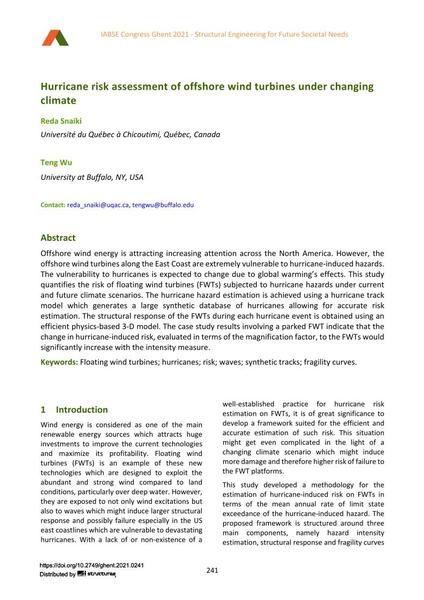Hurricane risk assessment of offshore wind turbines under changing climate

|
|
|||||||||||
Détails bibliographiques
| Auteur(s): |
Reda Snaiki
(Université du Québec à Chicoutimi, Québec, Canada)
Teng Wu (University at Buffalo, NY, USA) |
||||
|---|---|---|---|---|---|
| Médium: | papier de conférence | ||||
| Langue(s): | anglais | ||||
| Conférence: | IABSE Congress: Structural Engineering for Future Societal Needs, Ghent, Belgium, 22-24 September 2021 | ||||
| Publié dans: | IABSE Congress Ghent 2021 | ||||
|
|||||
| Page(s): | 241-248 | ||||
| Nombre total de pages (du PDF): | 8 | ||||
| DOI: | 10.2749/ghent.2021.0241 | ||||
| Abstrait: |
Offshore wind energy is attracting increasing attention across the North America. However, the offshore wind turbines along the East Coast are extremely vulnerable to hurricane-induced hazards. The vulnerability to hurricanes is expected to change due to global warming’s effects. This study quantifies the risk of floating wind turbines (FWTs) subjected to hurricane hazards under current and future climate scenarios. The hurricane hazard estimation is achieved using a hurricane track model which generates a large synthetic database of hurricanes allowing for accurate risk estimation. The structural response of the FWTs during each hurricane event is obtained using an efficient physics-based 3-D model. The case study results involving a parked FWT indicate that the change in hurricane-induced risk, evaluated in terms of the magnification factor, to the FWTs would significantly increase with the intensity measure. |
||||
| Mots-clé: |
risque
|
||||
| Copyright: | © 2021 International Association for Bridge and Structural Engineering (IABSE) | ||||
| License: | Cette oeuvre ne peut être utilisée sans la permission de l'auteur ou détenteur des droits. |
||||
